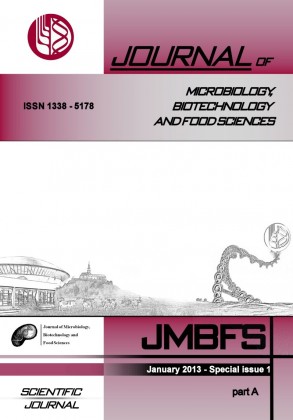EFFECT OF SOME FOODSTUFFS ON THE DEVELOPMENT IN DIABETES
Keywords:
Allium cepa L. (onion), Allium sativum L. (garlic), diabetes mellitusAbstract
From many reports it is clear that diabetes will be one of the major diseases in the coming years. Diabetes shows a wide range of variation in prevalence around the world and it is expected to affect 300 million by the year 2025. In a prevention framework where banning policies and educational strategies lead the interventions, functional foods (FFs) with their specific health effects could, in the future, indicate a new mode of thinking about the relationships between food and health in everyday life. Functional ingredients, such as cinnamon, garlic and onion have been addressed for their specific actions towards different reactions involved in diabetes development. This study was undertaken to assess the effect of garlic (Allium sativum L.) and onion (Allium cepa L.) consumptions on metabolic parameters related to diabetes. The animals were divided into six groups: one control and five experimental groups. All injections (onion and garlic extracts 200 mg/kg b.w./daily for 15 days ) were oral administered (per os = p.o.) at the volume of 100 μl. Thirty minutes after the last injection animals were anaesthetized and decapitated. The blood samples were collected from the carotid artery. The results indicate that the application of onion and garlic extracts were reduced glucose, cholesterol and triglyceride concentrations in blood serum of the mice with induced experimental diabetes.Downloads
Download data is not yet available.
Downloads
Published
2013-02-01
How to Cite
GreÅ„, A., Formicki, G., Kapusta, E., Szaroma, W., Muchacka, R., KopaÅ„ska, M., & Kraska, K. (2013). EFFECT OF SOME FOODSTUFFS ON THE DEVELOPMENT IN DIABETES. Journal of Microbiology, Biotechnology and Food Sciences, 2(special issue 2), 1205–1214. Retrieved from https://office2.jmbfs.org/index.php/JMBFS/article/view/7442
Issue
Section
Biotechnology
License
Copyright (c) 2013 Agnieszka Greń, Grzegorz Formicki, Edyta Kapusta, Waldemar Szaroma, Renata Muchacka, Marta Kopańska, Kinga Kraska

This work is licensed under a Creative Commons Attribution 4.0 International License.
All papers published in the Journal of Microbiology, Biotechnology and Food Sciences are published under a CC-BY licence (CC-BY 4.0). Published materials can be shared (copy and redistribute the material in any medium or format) and adapted (remix, transform, and build upon the material for any purpose, even commercially) with specifying the author(s).

